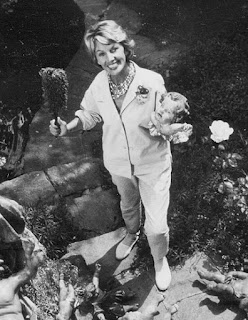No hay canción más conocida que esta Lili Marleen, que escuchamos tantas
veces en películas y documentales de la
Segunda Guerra Mundial. Lili Marleen fue
grabada innumerables veces, aquí es cantada por la británica Vera Lynn,
aunque una de las más icónicas es la grabación de Marlene Dietrich. Fue escrita como poema en 1915 y grabada por
primera vez en 1939 por Lale Andersen.
Los Nazis prohibieron la transmisión
de la canción por un tiempo y Anderson
debió grabar una nueva versión a gusto de Joseph
Goebbels. En vocabulario: billet y para saber: Vera Lynn
Vera Lynn is an English singer and
actress whose musical recordings and performances were enormously popular
during World War II…
"Lili Marleen" is a German
love song performed by Second World War,
which became popular during World War II
throughout Europe and the Mediterranean among both Axis and Allied troops.
 |
| Hitler junto a Mussolini |
Nazi officials did not approve of the song and Joseph Goebbels prohibited it from being played on the radio. Andersen was not allowed to perform in
public for nine months, not just because of the song but because of her
friendship with Jewish artists.
Andersen was so popular, however, that the
Nazi government allowed her to perform again, albeit subject to several
conditions, one of which was she would not sing "Lili Marleen". Goebbels
did order her to make a new "military" version of the song which was
recorded in June 1942.
 |
| Lale en su jardin, 1951 |
La letra
Underneath the
lantern
By the barrack
gate
Darling I
remember
The way you used
to wait
'Twas there that
you whispered tenderly
That you loved
me
You'd always be
My Lili of the
lamplight
My own Lili
Marleen
Time would come
for roll call
Time for us to
part
Darling I'd
caress you
And press you to
my heart
And there neath
that far off lantern light
I'd hold you
tight
We'd kiss good
night
My Lili of the
lamplight
My own Lili
Marleen
Orders came for
sailing
Somewhere over
there
All confined to
barracks
'Twas more than
I could bear
I knew you were
waiting in the street
I heard your
feet
But could not
meet
My Lili of the
lamplight
My own Lili
Marleen
Resting in our billet
Just behind the
line
Even though
we're parted
Your lips are
close to mine
You wait where
that lantern softly gleamed
Your sweet face
seems
To haunt my dreams
My Lili of the
lamplight
My own Lili
Marleen
Vera
Lynn - Lili Marlene
Para saber
Vera Lynn is an English singer and
actress whose musical recordings and performances were enormously popular
during World War II. She is widely
known as "the Forces'
Sweetheart" for giving outdoor concerts for the troops in Egypt, India, and Burma.
In 1941, during
the darkest days of the Second World War,
Lynn began her own radio program, Sincerely Yours, sending messages to British troops serving abroad. She and
her quartet performed songs most requested by the soldiers. Lynn also visited hospitals to interview
new mothers and send personal messages to their husbands overseas.
Vocabulario
A billet is a living quarters to which a
soldier is assigned to sleep. Historically, a billet was a private dwelling that was required to accept the
soldier.
Soldiers are
generally billeted in barracks or garrisons when not on combat duty; although in some armies soldiers
with families are permitted to maintain a home off-post. Used for a building,
the term billet is more commonly used
in British English; United States
standard terms are quarters, barracks,
Single (Soldier) Housing or Family Housing.
Artículos
relacionados
Hathcock
se alistó en el Cuerpo de Marines de los
EE. UU a la edad de 17 años... Francotirador
legendario
Tengo 92 años y estuve con el primer grupo de voluntarios británicos que fueron a España a ayudar en la defensa del
gobierno republicano español… Las
Brigadas Internacionales
Nos disparaban con armas calibre 50 y otras. También
nos bombardeaban con morteros… Sobre
la guerra civil en el Líbano
En
Preparación
Esto es parte del archivo: Lili Marleen
No comments:
Post a Comment